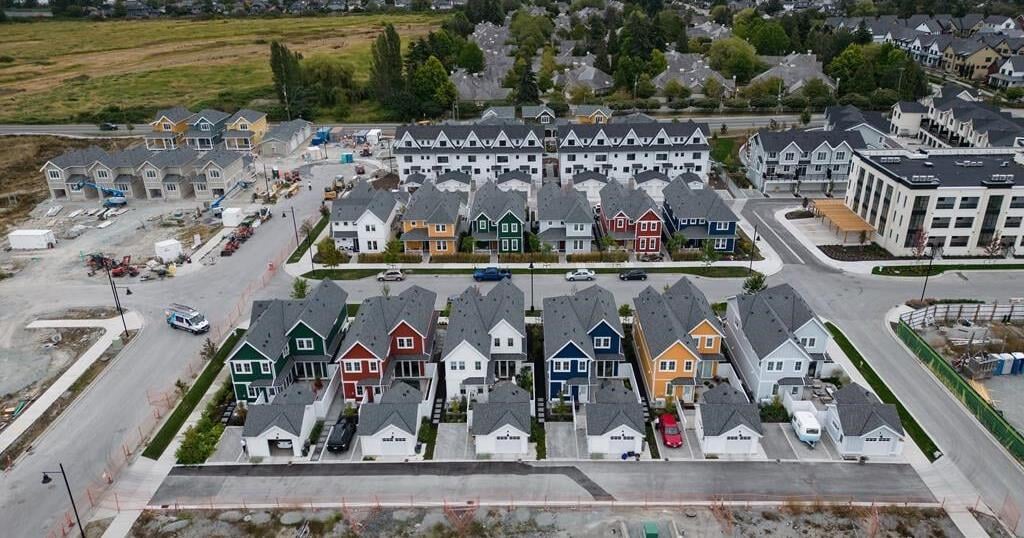Both of the main candidates in British Columbia‘s election campaign pushed their own plans to solve parts of the housing crisis.
B.C. Conservative Leader John Rustad told a news conference in Surrey that his government would end the multi-year permit delays and would get homes built at the speed and scale needed to address the housing crisis.
NDP Leader David Eby went to Cumberland on Vancouver Island to promote his party’s plan to fast-track factory-built homes.
Eby said pre-built homes would cut waste, reduce emissions, and advances in the industry mean the homes are “beautiful and high-quality.”
He said the process was “more like Lego” than normal construction.
“The idea is pretty straightforward. In a controlled factory environment, you can build faster, you can build with less waste and the homes that are built are more consistent and more efficient and it’s cheaper.”
Rustad said the Conservative Party of B.C. would redesign the approval process for home building, setting a six-month limit for rezoning and development permit and three months for a building permit.
“This means that we will significantly be able to improve the time frame it takes to actually get construction happening in this province, and we’ll be working with city halls across the province to be able to meet these timelines,” Rustad said.
If a clear yes or no isn’t issued by a city within that limit, the province would issue the permit, said a B.C. Conservative news release announcing the platform.
Rustad said the party would remove NDP taxes on housing, support transit-oriented communities, reform development cost charges and make taxes fair for homeowners.
“We have so much regulation that has been put in place associated with housing that it makes it really difficult for anybody to be able to actually get through and build things, not to mention the cost,” he said. “So we’ll amend the Local Government Act to prevent any home killing red tape that has been introduced by this government.”
The party’s statement also outlined their zoning plan, adding that it would work with BC Assessment “to make sure that current homeowners don’t get hit with higher tax bills based on future potential.”
The party statement said, if elected, a Conservative government would build new towns, saying B.C. is blessed with an abundance of land, but the NDP refuses to use it to end the housing shortage.
“We will identify land outside the Agricultural Land Reserve that has the potential to support beautiful new communities.”
A statement issued by the NDP on Friday said it would work with industry, municipalities and First Nations to create a provincewide framework for prefabricated homes so builders know what’s required in every community.
It said there would be a pre-approved set of designs to reduce the permitting process, and it would work to develop skills training needed to support prefabricated home construction.
The statement said Scandinavian countries had embraced factory-built homes, which “offer an alternative to the much slower, more costly process of building on-site.”
“By growing B.C.’s own factory-built home construction industry, everyone from multi-generational families to municipalities will be able to quickly build single homes, duplexes and triplexes on land they already own,” Eby said.
The party said legislation passed by the NDP government last year was a “game changer” for the factory-built home construction industry in the province, where there are currently 10 certified manufacturing plants.
Muchalat Construction Ltd. is one of them, and owner Tania Formosa said pre-approved structures speed up the building process considerably.
She said her company’s projects currently take 12 to 13 months to complete, from startup design to getting the house on site.
“If everything was in place and fast-tracked at the beginning and we were able to just fly along, it would probably take three months off the full schedule,” she said.
She said a main issue for modular manufacturers is that work gets stalled if they run into roadblocks with jurisdictions or BC Housing in the approval process.
“There’s no option for the manufacturer to start another project,” she said. “Having our products approved prior to the process would be amazing.”
She acknowledged the potential drawback of pre-approved designs creating a cookie-cutter look for some neighbourhoods.
“Unfortunately (what) happens in your jurisdiction, in your city, is it ends up looking a lot the same, but what are your priorities?”
This report by The Canadian Press was first published Sept. 27, 2024.

























